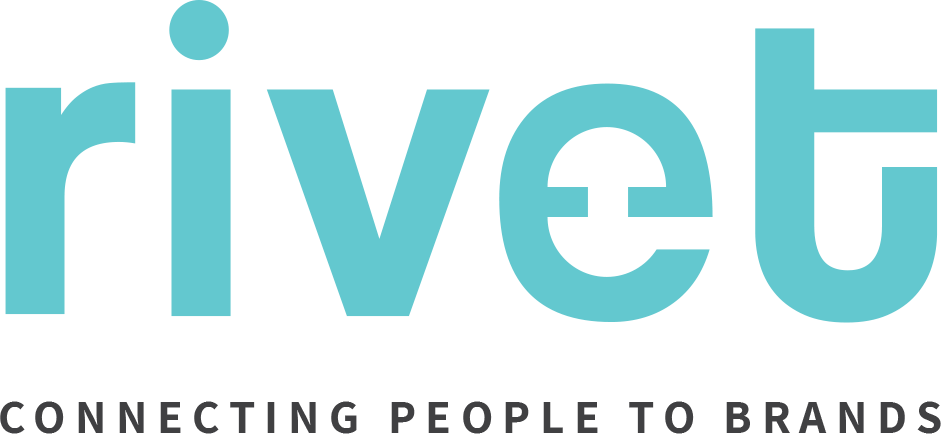Rivet empowers employees to remain authentic to themselves and to use their voice for good.
“Wherever you were yesterday, someone is there today.”
I wish I could remember the name of the woman who told me that, because it’s helped me overcome a lot of feelings of anxiety, self-doubt, and today’s big buzz term: imposter syndrome. Starting out in the big world of marketing without a list of achievements or a large network of people made it very difficult (for me) to do something I really wanted to—which was to write publicly.
I’ve always loved writing. In fact, writing helped me learn to better manage a lot of social anxiety when I was younger and made me (the quiet, shy kid) a much better communicator. I always credit my fourth grade teacher for that. She took extra time and care with developing me that year and it really changed my life forever. I truly believe that.
While I’ve always loved writing, it’s stayed exclusively within my own journals and personal online servers that I might share with a select group of friends. As a newbie marketer, I really wanted to start writing for the agency and get a blog going. I also wanted to grow my own network, my “tribe,” on platforms like LinkedIn. I knew what I had to do. But something was holding me back.
That’s when falling back on the idea of imposter syndrome hit me like a ton of bricks.
Did I actually have something meaningful to share?
Had someone already said that better than me?
Why should I, someone with less than a year of experience, even make a post?
I should just stay quiet.
I had become comfortable with taking the crawl, walk, run approach. I made my account “active” at least, by liking, sometimes commenting, and even sharing a post or two! But each time I had to write something, anything, there it was—mild anxiety, second-guessing, and discomfort.
And even as I write this, I wonder, “Does this sound crazy?”
I’ve used the term “imposter syndrome” to describe this experience before. It doesn’t feel great to admit. Through lots of affirmations, seeking extra validation on writing assignments, and relating to other young people I’ve talked to, I was making small steps to overcome what felt like an uphill battle. But I didn’t realize something very important—I was conducting my own form of self-therapy.
I attended an amazing panel discussion recently on employee advocacy, during which I had an “Aha!” Moment where I knew exactly what I wanted to say. We got onto the topic of imposter syndrome. It was then I realized that this idea was an even bigger problem than I had imagined.
Some historical context here…
The American Psychological Association doesn’t have an official diagnosis for it but, since the late 1970s, it’s been a blanket term that many psychologists acknowledge as, “a very real and specific form of intellectual self-doubt.” Before a 1978 study, there wasn’t even a term for it. The study1, conducted by psychologists Pauline Rose Clance and Suzanna Imes, focused on high-achieving women. They found that, regardless of “outstanding academic performance and professional accomplishments, women… persist in believing that they are really not bright and have fooled anyone who thinks otherwise.” These women do not experience an internal sense of success. They think they are imposters.
That wasn’t the “aha!” moment. That came from a comment made during the event by attendee, Content & Editorial Leader, Storyteller, and self-proclaimed recovering journalist Ashley Amber Sava. Ashley is an experienced marketer and communicator with over 14,000 followers on LinkedIn who tune in to her well-thought-out takes on journalism, leadership, content marketing, and workplace experience.
Ashley said this, “Today, we look at imposter syndrome as something wrong with ourselves and don’t take historical and cultural contexts into account. Worse, our view perpetuates a narrative of fixing people at work rather than addressing the toxic workplace environments.”
She went on to talk about how important issues such as systemic racism, xenophobia, classism, and other biases were absent when imposter syndrome was first formulated. It isn’t just high-achieving women who experience this. It includes people of color, of various income levels, and professionals of many other backgrounds as well.
Ashley noted that the creation of this syndrome has in recent years, due to its prevalence, trickled down to men in the workplace as well. But the underlying truth remains: people aren’t feeling like imposters because they aren’t good enough or for some sort of deficiency. They feel like imposters because positioning in the industry and workplace has a long-standing history of discrimination and/or exclusion.
Another speaker at the event noted that the term, while developed without considering these biases, has become so prevalent in recent years that it won’t be easy to get rid of. It is a blanket term that is being used whenever feelings of anxiety and doubt arise. It has become a self-reinforcer. Even worse is that, because it is such a common phrase now, most people will agree they relate to it on some level. There’s a bunch of young people, women, people of color, and so on, who are all feeling like they aren’t good enough to be where they’re at—and it’s holding them (and those around them) back.
Social media policies are stricter, corporate censorship on platforms like LinkedIn is at a high, and “imposter syndrome” is running rampant. The issue is multi-faceted and complicated to address. So, where can we start?
How do we make it better?
Well, the only reason I even have the courage to write this today is because I was empowered to do so. After the panel, I felt safe enough going to my direct boss (and president) of our woman-run agency to talk more about this topic. In the past, I worked for supervisors that did not inspire this authentic flow of communication. From the beginning of my stint at Rivet, I have been encouraged to be strong, to know my worth, and to be open/honest with my colleagues, myself, and those around me. It’s sad to say that this isn’t the norm for everyone.
The best way to beat this idea of imposter syndrome is going to come from both employees and employers working in tandem. The overuse of the term is still not including the additional negative impact on marginalized voices. And, even if that wasn’t a factor, many companies still aren’t empowering employees to use their voice.
A few things need to happen, to start:
- Companies should have a culture that uplifts employees to show up authentically, take the time to train employees to develop themselves as individuals, and let themselves (the company) be held accountable to remain honest.
- Employees and companies alike should take the time to look into the idea of imposter syndrome to become aware of the impact of it, and also where it truly comes from.
- Employees should continue to be bold, standing up for themselves and embrace the fire and passion within them.
It is vital that this is pursued—and wholeheartedly. Employees can be a company’s most powerful brand advocates. In today’s market (and especially moving forward), consumers are becoming more aware of the brands they want to consider buying into based on how happy the employees are. Lifting up those who have faced targeted mistreatment is better for the employees, which in turn, is better for business. I believe that it’s better to be an early adopter of this fact, or risk being left behind.
It won’t be easy. It is necessary. Because there’s someone where you were at yesterday, today. And we, all of us, can empower them to use their voice as well.
Blog Writer Emily Reed is a recent graduate from Florida Gulf Coast University’s Lutgert College of Business with a bachelor’s degree in Marketing. She is Brand Associate at Rivet, supporting marketing research, communications, account management, and other branding needs. Emily is passionate about Product/Brand management, her dog Shadow, and long walks on the beach.
Through different insights, the whole team at Rivet Brands strives to continue being exceptional for the clients and communities they serve.

